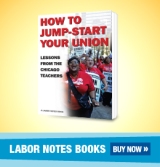Reading the news always tends to be a bit depressing, even in supposedly good times, but as the fitful and uneven recovery from the Great Recession grinds on, the economic outlook confronting millions of Americans becomes ever more bleak.
Massive cuts to state and local government budgets have produced four day school weeks in Hawaii, the shutdown of entire local transit systems in Georgia, and the indefinite darkening of streetlights in Colorado. Some states and localities are literally unpaving roads because gravel is less costly for them to maintain. Last week, the Department of Labor reported that the economy shed 131,000 jobs in July, as thousands of laid off state and local government employees joined former Census workers in the ranks of the jobless. Unsurprisingly, government figures released today showed that first time unemployment claims jumped last week to the highest level in six months. Initial claims rose to 484,000, the four week average hit 473,500, and claims for the previous week were revised upward to 482,000 from 479,000.
As companies continue to wring record profits out of their remaining workforces, there is currently little incentive for them to hire new workers. As such, it is estimated that there are approximately five applicants for each available job, and the number would be even higher if it weren’t for the fact that millions of people have simply dropped out of the labor market and stopped looking for work. The recession may technically be over, but many working people are living through a personal Great Depression, in every sense of that word.
On Tuesday, President Obama signed a good bill (aside from the cuts to food stamp funding that helped grease its passage) that will send $26 billion in federal aid to struggling states and cities. It includes $10 billion to prevent job losses among teachers, firefighters, and police officers, as well as $16 billion to help states cover their Medicaid costs. While necessary and helpful, this bill does very little to address the threat of deflation that currently confronts the economy. In order to generate the levels of employment necessary to stimulate effective demand, the federal government would need to embark on a massive spending program to put a significant dent in the jobs problem. But if passing a fully funded state aid bill that added nothing to the national debt required huge amounts of arm twisting and a special Congressional session that interrupted lawmakers’s August vacation, then you can be sure that the spending program we need won’t be coming from Congress any time soon.
If anything will be done to improve the lot of the unemployed, and especially the 1.4 million people who have been jobless for 99 or more weeks and have run out of employment insurance eligibility, the impetus will have to come from the unemployed themselves. Hearteningly, it looks as if an independent movement of the unemployed may be stirring. Led by self-described “99ers” – workers who have run out of their 99 weeks of unemployment eligibility – members of the Unemployed Workers Action Group and their allies (including this writer and other members of Democratic Socialists of America in New York) held a protest rally at Federal Hall on Wall Street to demand Congressional action to extend eligibility for unemployment benefits, a jobs program, and an end to credit checks on job applicants. Recently, Senator Debbie Stabenow (D-MI) introduced a bill to create a Tier 5 benefit that would extend unemployment eligibility an extra 20 weeks beyond the current limit and offer a tax credit to businesses that hire workers who have been jobless for 60 days or more. 99ers are focusing their short-term energies on supporting this bill, as should all progressives interested in organizing to support the unemployed.
While the emergence of open, organized dissent among the unemployed is a very exciting political development, it’s clear that it has a long way to go before it coheres into a movement to be reckoned with. Turnout to the rally was rather low, and a good portion of the crowd was composed of sympathizers from the unions and the community. As one of the unemployed speakers demonstrated, there is a real danger that the anger that the 99ers feel can very easily be turned on other sectors of the working class if not channeled toward the proper targets. While describing her fall from a highly paid worker in the corporate world to the ranks of the long-term unemployed, she railed against New York’s recent offer of a retirement incentive program to older unionized state workers as an affront to the jobless. This resentment toward the limited victories won by unionized workers, especially in the public sector, is troubling, but it speaks to very grave issues confronting the labor movement (such as it is). Unless the unions, and especially public sector unions, are successful in uniting all workers in support of a political program that can benefit the class as a whole, the unemployed will continue to suffer and organized labor will continue to be a scapegoat for the economic crisis.
Unemployed workers are beginning to fight. The Machinists Union (IAM) has created U-Cubed, a project organizing the unemployed. Working America and the AFL-CIO have organized the Unemployment Lifeline. Progressives everywhere need to support their efforts and offer a political analysis that seeks to focus the anger of the unemployed on the right targets – the bankers and politicians who got us into this mess, not other workers who could just as easily find themselves in the ranks of the jobless in the days ahead.
Chris Maisano is the editor of The Activist and the secretary of the NYC DSA Local.
Photo courtesy of Theresa Vigliarolo via UWAG
Filed under: Organizing, Politics | Tagged: Unemployed Workers Action Group, unemployment |






Not surprising, the unemployed have nothing to lose, they have no jobs, they have nothing to do and they can’t put food on the table. They have to do something, hence.